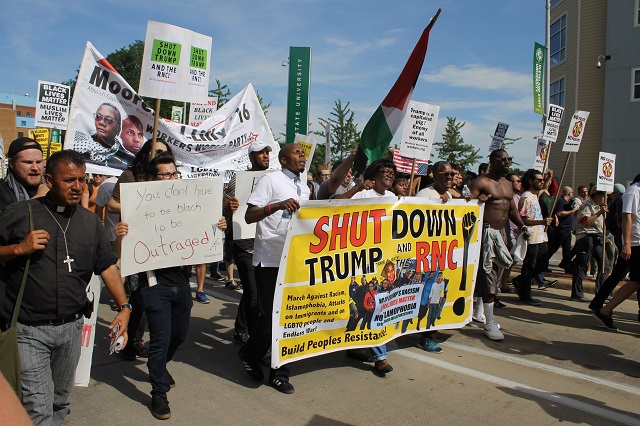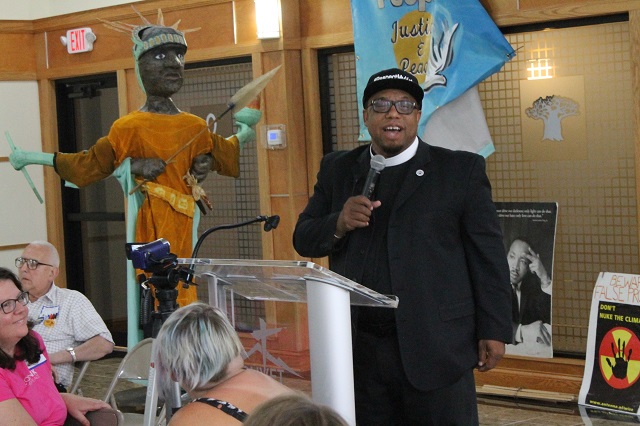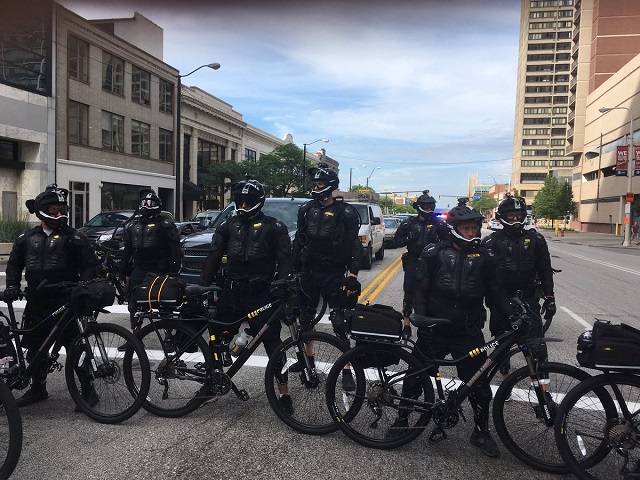
Part of the Series
Beyond the Sound Bites: Election 2016
Cleveland, Ohio—Advocacy organizations in Cleveland joined with activists from across the U.S. this weekend ahead of the Republican National Convention (RNC) to hold an alternative gathering: the People’s Justice and Peace Convention.
After several workshops and panels, organizers ultimately finalized their own platform affirming human, economic and environmental rights. Many also hit the streets to protest systemic police violence and to counter Republican Parry presumptive nominee Donald Trump and the party’s larger agenda.
Organizations including the Cleveland Nonviolence Network, Cleveland Peace Action, Cleveland Environmental Action Network, Organize Ohio!, Stop Targeting Ohio’s Poor, the Greater Cleveland Human & Civil Rights Coalition and Northeast Ohio Industrial Workers of the World, among many others, convened the Peace Convention throughout the weekend with the intention of creating a space for activists to respond to both major parties’ platforms in this election cycle.
Speakers, as well as performances, workshops and films addressed a host of issues, including voting rights, housing rights, militarism, agriculture, universal health care, corporate personhood, the prison industrial complex, systemic police violence, climate change and renewable energy. The Peace Convention’s organizers say neither major party is willing to authentically address these issues in their platforms or during their conventions.
“We wanted to identify core values that we thought would inform our practice, because we didn’t want a document that was just words,” said Maria Smith, who is a local activist and attorney at the Legal Aid Society of Cleveland, where she works to prevent evictions and to reduce barriers to affordable housing. “We wanted to create what we’re going to live out, a commitment to something bigger than ourselves, and longer than whatever happens to be the issue on the news headlines of the day. We wanted it to be what we are for, because activists can spend a disproportionate amount of time on what they’re against.”
The organizers of the Peace Convention established that its platform would be agreed upon by consensus of the participants. The final platform addresses many planks:
- Economic justice (which recognizes housing and health care as human rights)
- International justice (which includes creating a Department of Peace to resolve international conflict)
- Racial and social justice (which includes comprehensive immigration reform, ratification of the Equal Rights Amendment, federal protection of LGBTQ Americans and ending the criminalization of generations of people of color through racial profiling and mass incarceration)
- Political justice (which includes an amendment to the U.S. Constitution stating that corporations are not people and money is not speech, the dissolution of the Electoral College and the adoption of ranked-choice voting)
- A guiding principle of environmental justice, which acknowledges the threat of climate change and the necessity to allocate federal funds to transition the United States economy from fossil fuels to renewable energy.
According to organizers, the Peace Convention traces its legacy back to 1848 Women’s Convention in Seneca Falls, New York, and the 1851 Women’s Convention in Akron, Ohio. Organizers hoped to model their own platform positions after the Declaration of Sentiments adopted at the Seneca Falls Convention.
“This document, this statement can be the equivalent for nonviolence that the Declaration of Sentiments was [for women’s rights],” Smith said.
Rev. Lennox Yearwood, who is president of the “post-partisan” Hip Hop Caucus, spoke at the Peace Convention about his recent visit to Baton Rouge, Louisiana, where he attended the funeral of Alton Sterling, who was shot this month by two Baton Rouge police officers. “These kind of conventions empower the community and show how we are juxtaposed to the RNC…. That we are gathering and discussing what’s important for the people’s movement,” he told Truthout.

Medea Benjamin, co-founder of the antiwar group, CODEPINK, also spoke at the Peace Convention to highlight the victories achieved by supporters of presidential candidate Vermont Sen. Bernie Sanders’s campaign, and to connect the work of activists working to stop systemic police violence to other forms of state violence, such as war and imperialism.
“So much of it is about profit, and [weapons producers] build up these very strong lobby groups … that then use the political system to their advantage in a very corrupt way so that they can continue to destroy our communities and our world by dumping so much weaponry into it,” Benjamin told Truthout. “We even see our government doing it through this surplus Pentagon program that dumps military hardware into our police departments…. The profit motive is comparable overseas and domestically. It’s built on a system of racism. The racism we see at home is reflected in the racism of our foreign policy.”
The Cleveland Police Department (CPD) received a $50 million National Special Security Event federal grant to fund additional personnel and equipment to control protests and crowds at the RNC. That equipment was on display throughout the weekend, with police from several federal and local agencies out in full force on the streets around the Quicken Loans Arena where the convention is taking place. Officers from the Secret Service and the Department of Homeland Security milled about on almost every street corner in downtown Cleveland. A large number of CPD officers in body armor patrolled the streets and corralled protesters on bicycles.
Police in Cleveland are on heightened alert after five police officers were recently shot and killed in Dallas, Texas, and another three officers were shot Sunday in Baton Rouge. CPD is now requesting a temporary suspension of Ohio’s open carry law throughout the entirety of Cuyahoga County until the RNC is over.

Police carefully controlled several protests that took place over the weekend, including a march against racism and white supremacy, the Keep the Promise march calling to expand health care access and an end corporate drug pricing, and the Shut Down Trump and the RNC march and rally.
Our most important fundraising appeal of the year
December is the most critical time of year for Truthout, because our nonprofit news is funded almost entirely by individual donations from readers like you. So before you navigate away, we ask that you take just a second to support Truthout with a tax-deductible donation.
This year is a little different. We are up against a far-reaching, wide-scale attack on press freedom coming from the Trump administration. 2025 was a year of frightening censorship, news industry corporate consolidation, and worsening financial conditions for progressive nonprofits across the board.
We can only resist Trump’s agenda by cultivating a strong base of support. The right-wing mediasphere is funded comfortably by billionaire owners and venture capitalist philanthropists. At Truthout, we have you.
We’ve set an ambitious target for our year-end campaign — a goal of $150,000 to keep up our fight against authoritarianism in 2026. Please take a meaningful action in this fight: make a one-time or monthly donation to Truthout before December 31. If you have the means, please dig deep.